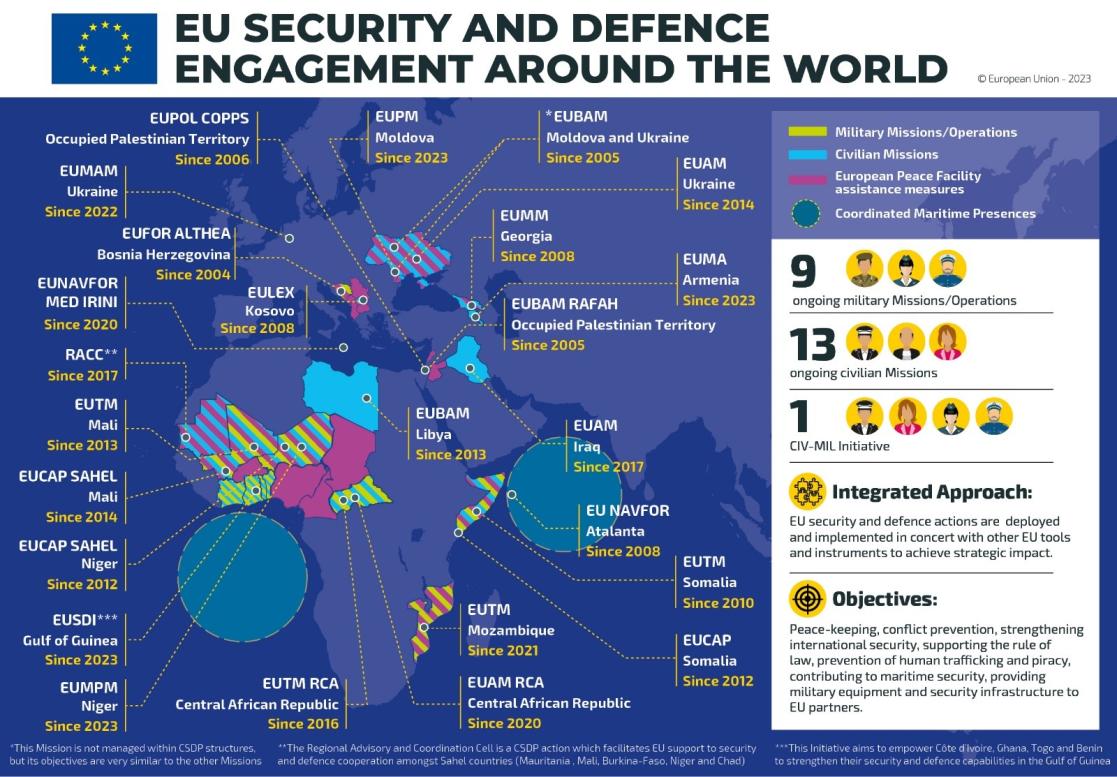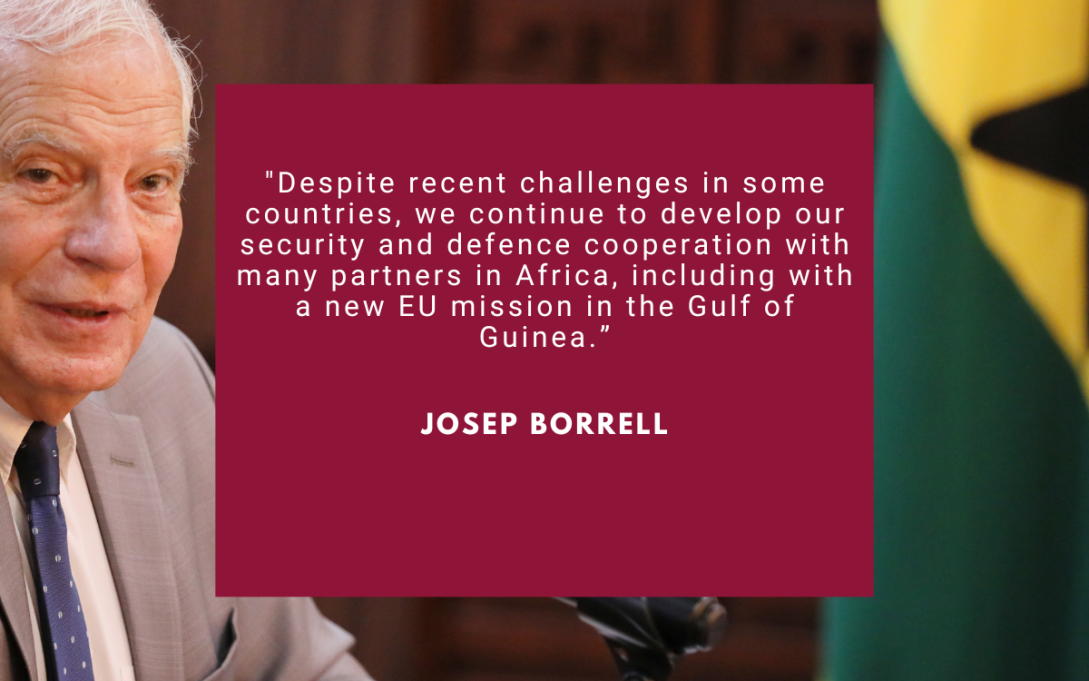
几内亚湾:非洲新的安全与防务伙伴关系
https://www.eeas.europa.eu/eeas/gulf-guinea-new-security-and-defence-partnership-africa_en
2023年12月18日 何塞普·博雷尔,欧盟外交与安全政策高级代表/欧盟委员会副主席
人力资源/副总裁博客 - 在上届外交事务理事会期间,我们决定发起一项新举措,支持几内亚湾四个沿海国家应对来自萨赫勒地区的威胁。 尽管发生了针对乌克兰的侵略战争以及最近与一些萨赫勒国家在军事政变后面临的挑战,但我们继续与许多愿意作为可靠伙伴与我们合作的非洲国家发展安全和防务合作。
加纳
恐怖主义和不安全局势从萨赫勒地区蔓延到几内亚湾国家已不再是威胁; 这是现实。 为了限制其影响,欧盟致力于帮助科特迪瓦、贝宁、加纳和多哥加强应对北部地区恐怖武装团体施加压力的能力。
轻巧灵活的民用和军用欧盟使命
根据战略指南针提出的新方法,它将采取轻型、灵活的欧盟特派团的形式,将民用、军事和反恐专业知识与装备支持结合起来。 正是在这种背景下,我去年10月前往加纳,向该国安全部队移交了105辆装甲车。 这项努力将补充我们现有的人道主义和发展合作计划。
加纳
这项新举措还将补充我们通过 2021 年启动的海上协调存在 (CMP) 对雅温得架构区域组织持续提供的海上安全支持。几内亚湾确实是尼日尔开采石油的重要门户。 三角洲,以及往返中非和南部非洲的货物运输。 目前它正受到海盗和有组织犯罪的威胁。
欧盟在非洲之角地区也很活跃
在非洲之角附近,亚特兰大行动也发挥着类似的作用。 自 2008 年以来,该组织的行动大幅减少了这条欧洲和非洲重要供应路线上的海盗活动。 在我们庆祝其成立 15 周年之际,该行动将继续保护海上交通并为这一关键地区的海上安全做出贡献。 去年十月访问阿曼时,我登上了它的一艘船。 在陆地上,十多年来我们也帮助索马里重建安全和国防力量,使索马里重新完全掌控自己的安全。 我亲眼目睹了 2022 年 9 月开展的工作的规模。
与此同时,我们的伊里尼海军任务为地中海的海上安全与稳定做出了贡献,控制了联合国对利比亚的武器禁运,而另一个欧盟任务也在帮助该国加强边境管理并打击跨境犯罪和恐怖主义。 近期,利比亚要求我们加大这方面的努力。
在非洲大陆的另一端,德尔加杜角地区遭受叛乱活动困扰的莫桑比克也要求我们帮助其安全部队应对这一挑战。 自2021年10月以来,我们一直在训练莫桑比克武装部队,我们的训练工作得到了欧洲和平基金提供的装备支持的补充。 我于2022年10月去那里会见了我们的团队和国家领导人,并亲眼目睹了我们工作的具体成果。
尼日尔军政府发出敌对信号
我们对几内亚湾国家作出新的承诺之际,尼日尔军政府决定撤销欧盟在该国的防务和安全任务的法律依据,尽管他们提供了有效的支持。 这是非法军政府推翻民选总统的又一个敌对信号。 最近的历史表明,驱逐支持改善萨赫勒安全的合作伙伴只会给恐怖主义和不安全留下更多空间。
最近的历史表明,驱逐支持改善萨赫勒安全的合作伙伴只会给恐怖主义和不安全留下更多空间。
在敌对欧洲的外国行为者的怂恿下,该地区的不稳定局势日益加剧,我们的安全和防务任务在马里和中非共和国等国家也遇到了困难。 但是,像科特迪瓦、贝宁、加纳、多哥、利比亚、索马里或莫桑比克一样,许多非洲国家愿意与欧盟在安全问题上合作,我们准备在未来几个月内与那些愿意在这一领域开展更多工作的国家合作。 想要与我们合作。
持久安全只能来自经济社会发展
国防和安全当然不是我们建议发展伙伴关系的唯一领域非洲国家。 我们深知,持久安全只能来自经济和社会发展,来自所有人获得教育、卫生服务、电力等。这就是为什么我们还在这些领域与非洲大陆国家建立了众多伙伴关系,特别是 全球门户计划的一部分。
https://www.eeas.europa.eu/eeas/gulf-guinea-new-security-and-defence-partnership-africa_en

The spill over of terrorism and insecurity from the Sahel to the countries of the Gulf of Guinea is not a threat anymore; it is a reality. To limit its impact, the EU is committed to help Côte d’Ivoire, Benin, Ghana and Togo reinforce their capabilities to respond to the pressure exerted by terrorist armed groups in their northern regions.
In line with the new approach proposed in the Strategic Compass, it will take the form of a light and flexible EU Mission, combining civilian, military and counter-terrorism expertise in conjunction with equipment support. It was already in this context that I travelled to Ghana last October and handed over to the country's security forces 105 armoured vehicles. This effort will complement our existing humanitarian and development cooperation programmes.

This new initiative will also complement our ongoing security support at sea to the regional organisation of the Yaoundé Architecture through the Maritime Coordinated Presence (CMP), which started in 2021. The Gulf of Guinea is indeed a vital gateway for shipping oil extracted in the Niger delta, as well as for transporting goods to and from central and southern Africa. It is currently under threat from piracy and organised crime.
Off the Horn of Africa, Operation Atalanta has a similar role. Since 2008, its action has led to a massive reduction in piracy on this vital supply route for Europe and Africa. As we celebrate its 15th anniversary, the operation continues to protect maritime traffic and contribute to maritime security in this critical area. I was on board of one of its ships last October when I visited Oman. On land, we have also been helping Somalia rebuild its security and defence forces for over ten years so that the country can retake full control of its own security. I witnessed the extent of the work carried out first-hand in September 2022.
In parallel, while our Irini naval mission contributes to maritime security and stability in the Mediterranean, controlling the UN arms embargo to Libya, another EU mission is also helping the country to reinforce border management and fight cross-border crime and terrorism. Recently, Libya has asked us to intensify our efforts in this area.
At the other end of the African continent, Mozambique, which is suffering from insurgency activities in the Cabo Delgado region, has also asked us to help its security forces meet this challenge. Since October 2021, we have been training units of the Mozambican armed forces and our training efforts were complemented by equipment support provided under the European Peace Facility. I went there in October 2022 to meet our teams and the country's leaders and witness first-hand the concrete results of our work.
Our new commitment to the Gulf of Guinea countries comes at a time when, in Niger, the military junta has decided to revoke the legal basis for the EU defence and security missions in the country despite the effective support they delivered. This is another hostile signal sent by an illegitimate military junta, which overthrew a democratically elected president. Recent history shows that expelling partner supporting efforts to improve security in Sahel results only in leaving more room for terrorism and insecurity.
Recent history shows that expelling partner supporting efforts to improve security in Sahel results only in leaving more room for terrorism and insecurity.
Our security and defence missions also encounter difficulties in countries like Mali and Central African Republic against a backdrop of increasing destabilisation in the region, encouraged by foreign actors hostile to Europe. But, like Côte d’Ivoire, Benin, Ghana, Togo, Libya, Somalia or Mozambique, many African countries are willing to work with the EU on security issues, and we are ready to do more in this area in coming months with those who are wanting to partner with us.
Defence and security is of course not the only field for partnership that we propose to develop with African countries. We are well aware that lasting security can only come from economic and social development, from access for all to education, health services, electricity, etc. That is why we are also establishing numerous partnerships in these areas with countries on the continent, particularly as part of the Global Gateway initiative.